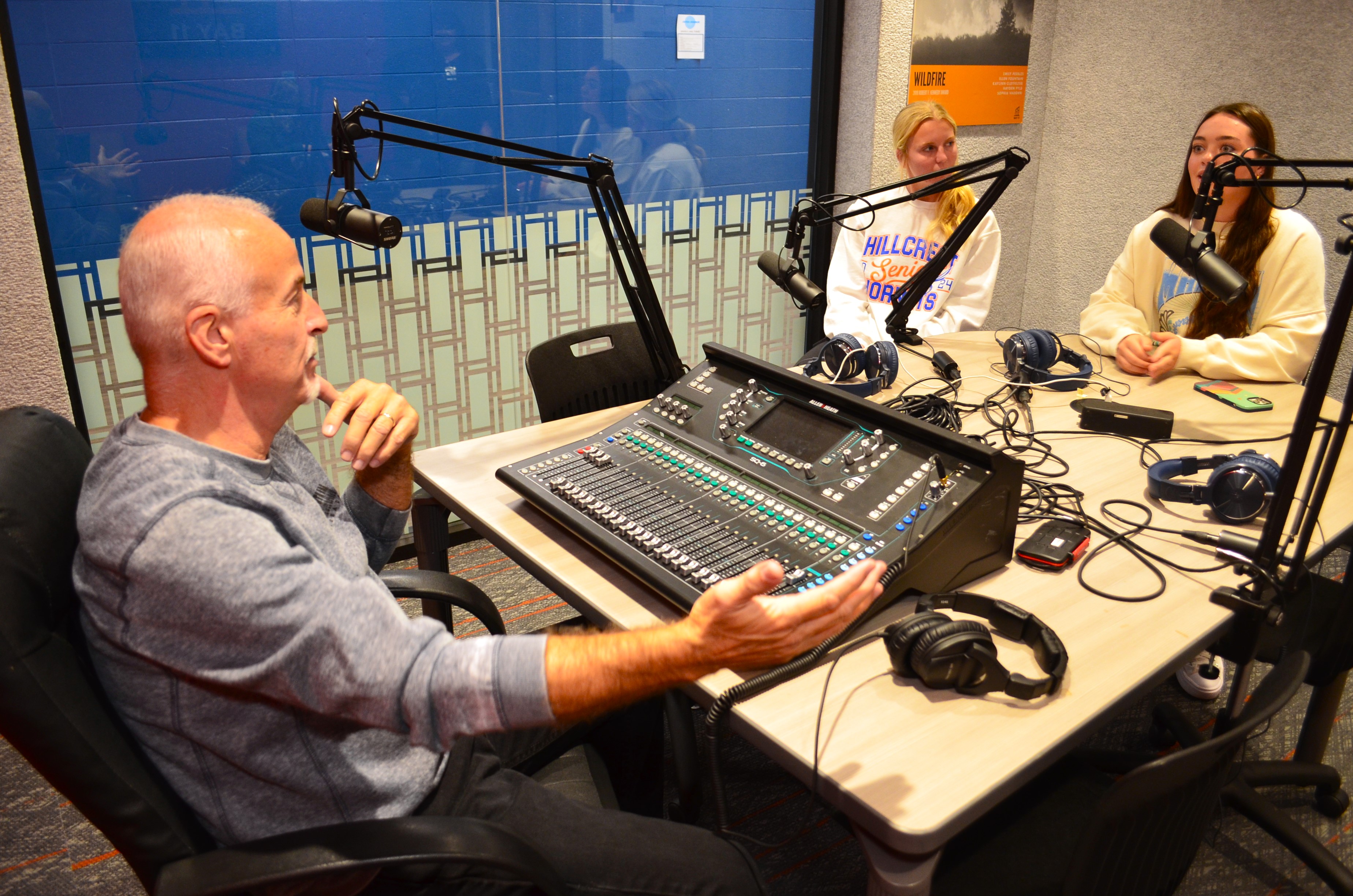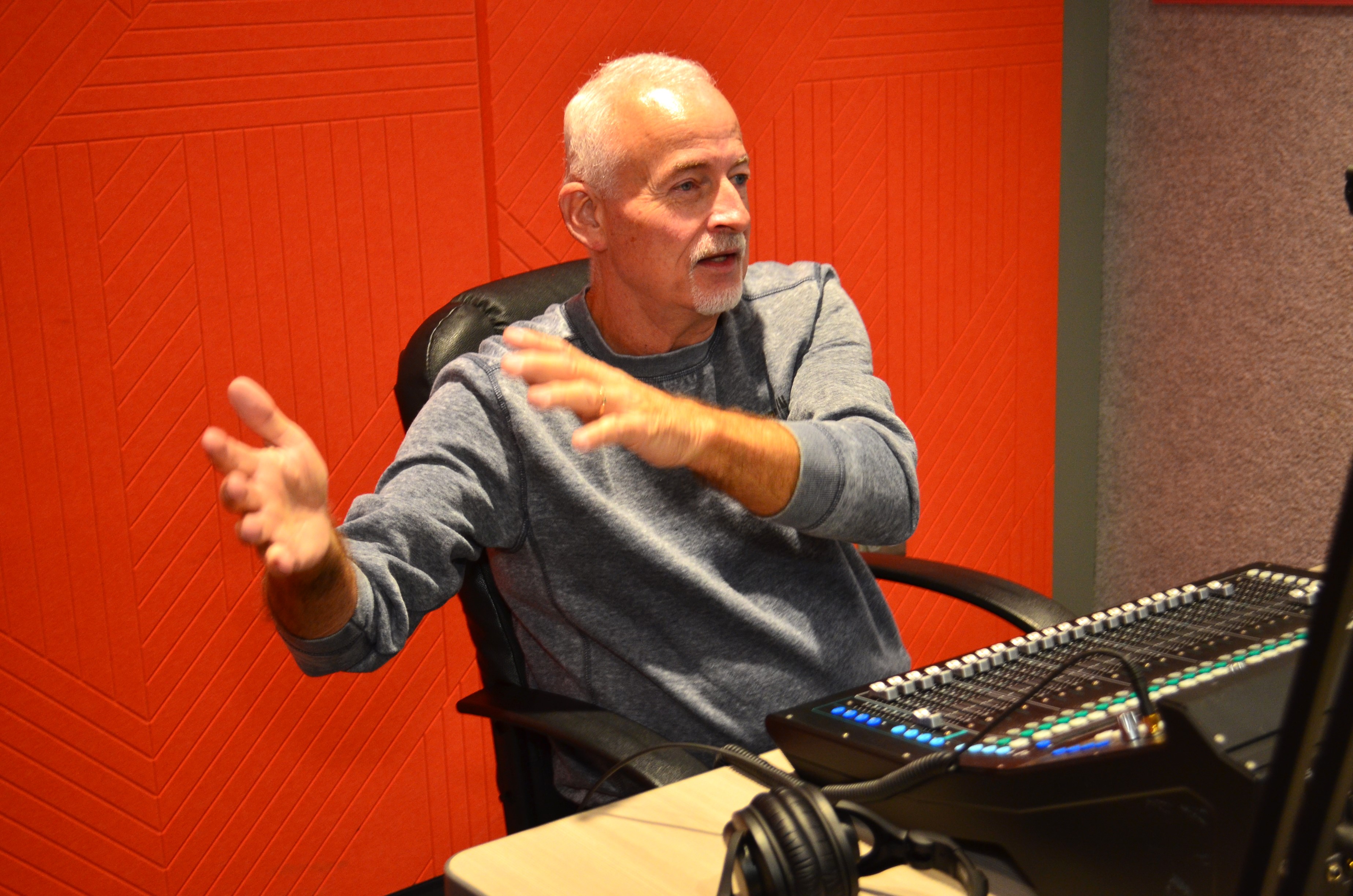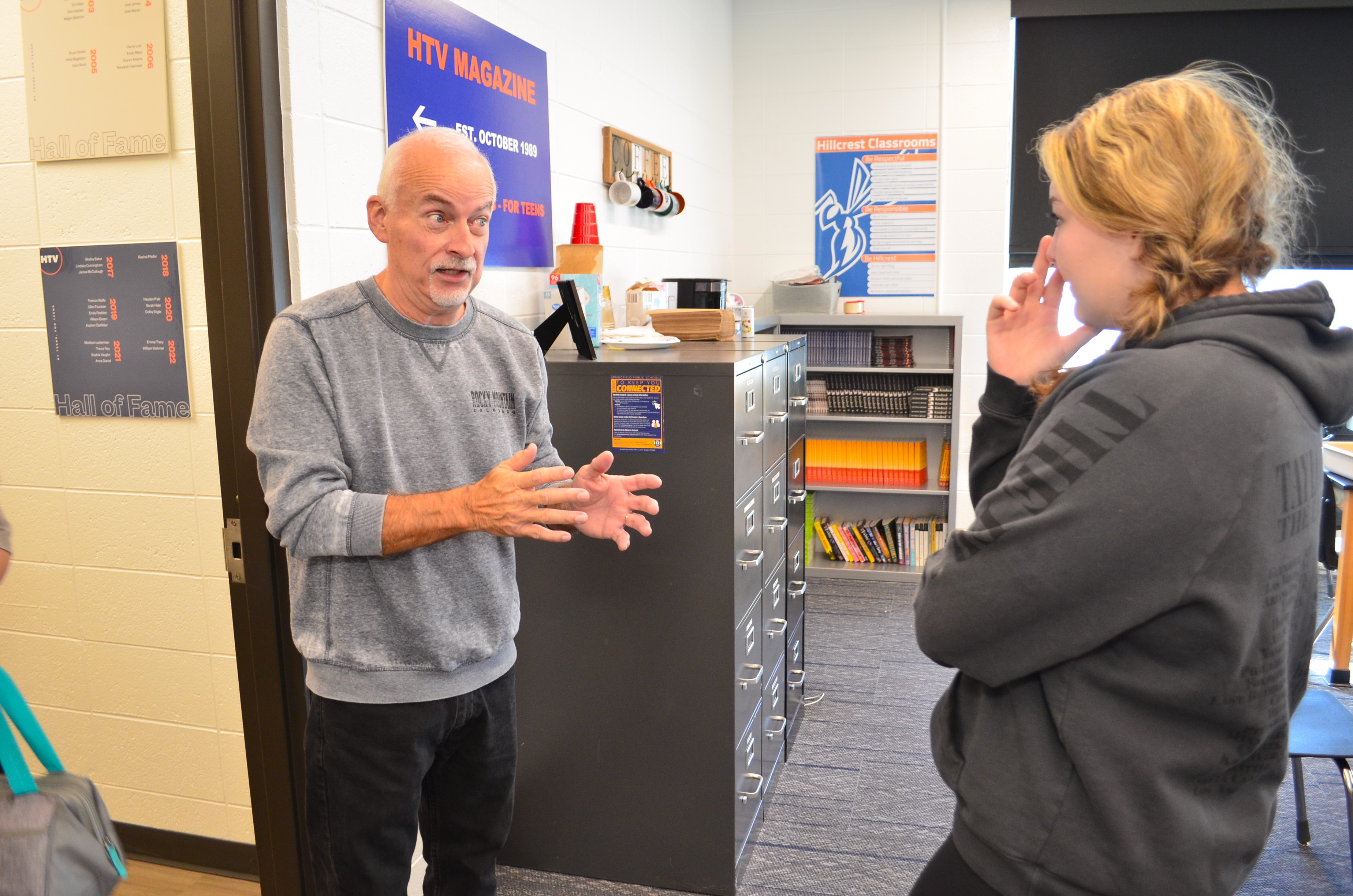Dave Davis sensed impending doom for two students’ project.
The students had taken video of a house fire and were pitching it on Tuesday for HTV, a monthly video magazine made by students at Springfield's Hillcrest High School. But Davis, the instructor and advisor for HTV, didn’t see much use — they don’t usually cover house fires.
Nevertheless, he gave the students a shot to make their pitch. In Bay 11, a historically named studio as a meeting room, he listened to junior Sydney Peck and senior Shelby Epperly make their pitch.
The two students described how they located the fire from a plume of smoke. They got footage of the burning home on their cellphones, as well as interviews with firefighters about how they handled the blaze. They talked to a Hillcrest graduate who had helped the family escape the burning home. They tried to get an interview with family members, but found it difficult, because ...
“Hang on,” Davis interrupted. “A Hillcrest graduate helped them!? I think you are, what we call, burying the lede, here!”
The buried lede saved the project. Davis spent a few more minutes talking with Peck and Epperly about the project, giving direction and encouraging feedback about additional footage, follow-up questions and deeper interviews.
Before that session, Davis was struggling with other students to get wireless lavalier microphones working. Afterward, he helped evaluate the work of two other students in one of the other production bays.
Typical Tuesday.
Davis is anything but typical in his classes, however. He sounds more like a grizzled veteran editor than a teacher. For more than 33 years, he has helped grow HTV into a powerhouse of broadcast education, inspiring students to great accomplishments.
Winning Emmy recognition

The HTV class is an elite class, Davis said, with students culled from two broadcast journalism classes with about 50 students between them. This year, 19 students are part of the HTV staff.
HTV student journalists have a long history of winning awards. Just last year, HTV won three first-place awards in student production from the National Academy of Television Arts and Sciences Mid-America Foundation. Over the years, HTV earned more than 30 first-place awards from that group, as well as 15 Broadcast Pacemaker Awards and 10 Robert F. Kennedy High School Journalism Awards.
Davis recently won a prestigious award of his own.
Earlier this year, he was named to the Silver Circle of the Mid-America Chapter of the National Academy of Television Arts and Sciences — the organization that runs the Emmy Awards. Davis was recognized alongside KY3’s Lisa Rose and St. Louis broadcast journalist Shirley Washington, two longtime broadcasters.
Not bad for someone who has never worked as a journalist.
“It was kind of a validation that we were doing something right, and that all this work that all of these kids had done means something,” Davis said. “I was the guy that got the light shined on me that night, but I feel like it was all of HTV, kids past and present, that got the pat on the back.”
Growing from the ground floor

Older students know him as Coach Davis. A teacher at Hillcrest for 41 years, he was a coach of a baseball team that earned state championships and national recognition. Davis launched his career to teach journalism.
In 1988, he was teaching English and coaching at Hillcrest. One evening, as he was watching TV while recovering from an injury, he discovered a cable channel showing a program recorded at another school. And that woke up something in his soul.
“The show was an attempt to do some sort of broadcasting,” Davis said. “I was an English teacher and a coach, but at my heart, I was a journalism teacher. That’s what I majored in, journalism, so I wanted to teach it.”
Hillcrest students were eager to make TV
He spoke to the principal and discovered that Telecable had already equipped each of Springfield’s high schools with a hard-wired modulator — all the school needed to be a public access channel. Davis set up a broadcast journalism class and found a tremendous turnout, with 65 students in two classes.
HTV started with one camera, one VCR and a TV on a cart.
“We didn’t have a tripod or a mic. I had no background in TV,” Davis said. “I looked at these kids and said that we are going to do some sort of show, so what is it going to be?”
Those classes tossed several ideas around, but landed on a news magazine format, because it gave students an opportunity to dive in to issues teens care about. That theme, stories by teens for teens, has been the focus of each episode since then.
Every year, Davis tried to offer something beyond a typical classroom experience. He tried to act more like an editor or adviser. Instead of teaching students through assignments, he wanted the atmosphere of a working newsroom. He eventually passed the torch of Hillcrest's baseball program to another coach.
Coaching a good background for teaching journalism

The main question Davis presents to students is whether teens would care about the story they pitched. Through that lens, he could also get students to consider an important related question: whether or not teens should care.
“I didn’t want this to be me telling them what to do all the time,” Davis said. “I wanted them to tell me what they wanted to do, then ask questions and pick those things apart. That’s kind of my role, to advise, nudge and question, and that’s worked really well.”
His experience coaching helped shape the way he advises students in the program. Davis sets standards and tries to be hard to impress, so that students can achieve higher levels, he said. If students want to do a show they are proud of, Davis said he coaches them to find interesting stories, hone them and ask questions that help strengthen the work.
Back to work in Bay 11
Peck said she got interested in HTV because it looked like fun. She loves the opportunity to be creative and take on challenges that she normally doesn’t get the opportunity to do.
“(Davis) is such a great teacher,” Peck said. “You don’t even realize he’s teaching you something until you really think about it, because he just teaches so effortlessly.”
Epperly agreed, thinking about the house fire discussion earlier.
“It’s very intense at first, because you have to learn all this editing, photography and how to interview people,” Epperly said. “There is a lot that he does that teaches it so well.”
As Davis talked about that philosophy, and how he does not like to spend a lot of time lecturing at the front of the class, a student listening in with the Hauxeda’s interview helped confirm Davis’ method. Senior Abi Phillips held up a photo of a presentation Davis showed earlier Tuesday.
It was four words long: “Suck less, win awards.”
“I’ve been in HTV for three years, and we have a theory that he likes students only after they have been gone for long enough that he can tell them what they did was good,” Phillips said, smiling at Davis. “So he hates me right now, but in four years, we’ll be besties for sure.”
The approach resonated with many students, including recognizable names in the industry. Ashley Reynolds, of KY3, has become respected for her “On Your Side” segments. Davis remembers a student who had a fire in the belly for the trade.
Another student, Dan Arnall, was part of HTV up until his graduation in 1992. He is now a respected, Emmy-winning national broadcast journalist with leadership experience at ABC News, Bloomberg Television and NBC News, and is currently with MSNBC Reports. He was inducted this year into the Springfield Public Schools Hall of Fame.
Tech changes, but not focus

Now in its 34th year, HTV has changed considerably from its days with one camera and one television. It has expanded into a new space created from a 2019 election project, and now has a vast array of cameras it has collected over the years. It is equipped with 12 of the same types of small TV production booths seen in commercial TV station newsrooms, as well as a space for creating sets and backgrounds.
Yet, all that equipment is starting to get outdated by the mobile devices Hillcrest students carry in their pockets and backpacks. Despite all the eras Davis has led the HYV program through, it’s this era of high-powered tech that focuses on his core beliefs. The cameras and mics that may have been rare at one time are outclassed by a phone.
“That’s probably the biggest thing I have had to understand in the last few years,” Davis said. “I have to hone in on what they can do with this technology. It’s for more than silly stuff on Snapchat, or getting people to click a heart on Instagram. We need to go for substance.”
What's next for Dave Davis?
He has also helped student journalists, and their teachers, connect. He helped found the Student Television Network, and he also is the host and director of a national workshop for broadcast journalism teachers, where he helps train educators from around the world.
HTV students are currently at work on the next episode. Epperly, one of the co-hosts for the year’s first episode, can focus with Peck on their house fire story.
While Davis will get a variety of questions from those students as they develop their segments, he said he gets only one basic question from parents: When will he retire?
He has no answer, other than a baseball reference: It’s a Walter Alston “year after year.” But the fact that he gets asked that question gives him a lot of gratitude and validation.
“I get asked that a lot. They say they have a kid in ninth grade or so, and want to know long I’ll stay around,” Davis said. “That is the ultimate compliment, for them to wonder if I’ll still be here when their kid comes up. They want me to be here for their kid, and that’s huge.”

